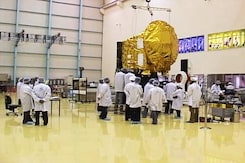Earth Like Planet
- All
- News
- Videos
- Web Stories
-

New NASA Study Explains How Earth Got Its Water
- Sunday January 25, 2026
- World News | Edited by NDTV News Desk
A NASA study shows that meteorites delivered only a small amount of water to Earth over the past four billion years.
-
 www.ndtv.com
www.ndtv.com
-

Why Venus Is the Brightest Morning Star Visible From Earth
- Thursday December 25, 2025
- NDTV
Venus appears so bright in the sky due to reflective sulfuric acid clouds, its closeness to Earth, and sunlight scattering that creates optical effects like a glory.
-
 www.gadgets360.com
www.gadgets360.com
-

TRAPPIST-1e Methane Signal Likely False, Webb Data Suggests Airless Planet
- Thursday December 11, 2025
- Written by Gadgets 360 Staff
The TRAPPIST-1 planetary system, located about 39 light-years from Earth, hosts seven rocky worlds orbiting a cool red dwarf star. While several of these Earth-sized planets lie in the star’s habitable zone, new observations from the James Webb Space Telescope suggest their atmospheres may be too thin to support life. Earlier hints of methane aro...
-
 www.gadgets360.com
www.gadgets360.com
-

NASA's Astronomers Reveal Red Giant Stars May Destroy Their Own Planets
- Monday November 10, 2025
- Science | Edited by Astitva Raj
This extreme expansion poses a serious threat to nearby planets. For example, when the Sun becomes a red giant in about 5 billion years, it will likely swallow Mercury and Venus.
-
 www.ndtv.com
www.ndtv.com
-

Scientists Stunned as Earth’s Magnetosphere Shows Reversed Electric Charge Patterns
- Sunday November 2, 2025
- Written by Gadgets 360 Staff
Scientists have discovered that Earth’s morning-side magnetosphere is negatively charged, overturning decades of assumptions about space electricity. Satellite data and simulations show the charge pattern flips near the equator but remains traditional at the poles. The breakthrough reshapes understanding of space weather and may also clarify elec...
-
 www.gadgets360.com
www.gadgets360.com
-

Ryugu Samples Reveal Ancient Water Flow on Asteroid for a Billion Years
- Saturday October 18, 2025
- Written by Gadgets 360 Staff
Microscopic samples from asteroid Ryugu reveal that liquid water once flowed through its parent body long after its formation. The finding, led by University of Tokyo scientists, suggests that such asteroids may have delivered far more water to early Earth than previously thought, offering a new perspective on how our planet’s oceans originated.
-
 www.gadgets360.com
www.gadgets360.com
-

Astronomers Detect Hints Of Hidden Earth-Sized Planet Beyond Neptune
- Wednesday October 15, 2025
- Written by Gadgets 360 Staff
Astronomers propose the existence of ‘Planet Y’, a hidden Earth-size planet that may orbit closer than the theorized ‘Planet Nine’. Based on Kuiper Belt object patterns, the study suggests a rocky world influencing orbital tilts. Experts remain divided, but upcoming sky surveys could soon confirm or rule out its existence.
-
 www.gadgets360.com
www.gadgets360.com
-

Not Like Venus Or Mars, Distant Exoplanet May Have Atmosphere Like Earth's
- Friday September 19, 2025
- World News | Edited by NDTV News Desk
A distant exoplanet might have an atmosphere similar to Earth's, early observations from the James Webb Space Telescope (JWST) suggest. It is part of a group of planets orbiting a star called TRAPPIST-1, about 40 light-years away from Earth.
-
 www.ndtv.com
www.ndtv.com
-

New 'Quasi-Moon' Discovered in Earth Orbit May Have Been Hiding There for Decades
- Sunday September 14, 2025
- Written by Gadgets 360 Staff
Astronomers have identified asteroid 2025 PN7 as a possible quasi-moon of Earth, trailing our planet for nearly 70 years. At just 62 feet wide, it is the smallest and least stable quasi-satellite detected so far. Researchers believe advanced observatories like the Vera Rubin Observatory could uncover more hidden companions in Earth-like orbits
-
 www.gadgets360.com
www.gadgets360.com
-

NASA Missions Uncover a Diverse Galaxy of Super-Earths, Raising New Questions About Planetary Evolution
- Thursday August 14, 2025
- Written by Gadgets 360 Staff
Super-Earths are among the most common planets in the galaxy, yet none exist in our solar system. Larger than Earth but smaller than Neptune, they range from ocean-covered worlds to scorched, atmosphere-less rocks. Some orbit within habitable zones, making them prime candidates for life. NASA’s Kepler and TESS missions, along with upcoming telesc...
-
 www.gadgets360.com
www.gadgets360.com
-

New NASA Study Explains How Earth Got Its Water
- Sunday January 25, 2026
- World News | Edited by NDTV News Desk
A NASA study shows that meteorites delivered only a small amount of water to Earth over the past four billion years.
-
 www.ndtv.com
www.ndtv.com
-

Why Venus Is the Brightest Morning Star Visible From Earth
- Thursday December 25, 2025
- NDTV
Venus appears so bright in the sky due to reflective sulfuric acid clouds, its closeness to Earth, and sunlight scattering that creates optical effects like a glory.
-
 www.gadgets360.com
www.gadgets360.com
-

TRAPPIST-1e Methane Signal Likely False, Webb Data Suggests Airless Planet
- Thursday December 11, 2025
- Written by Gadgets 360 Staff
The TRAPPIST-1 planetary system, located about 39 light-years from Earth, hosts seven rocky worlds orbiting a cool red dwarf star. While several of these Earth-sized planets lie in the star’s habitable zone, new observations from the James Webb Space Telescope suggest their atmospheres may be too thin to support life. Earlier hints of methane aro...
-
 www.gadgets360.com
www.gadgets360.com
-

NASA's Astronomers Reveal Red Giant Stars May Destroy Their Own Planets
- Monday November 10, 2025
- Science | Edited by Astitva Raj
This extreme expansion poses a serious threat to nearby planets. For example, when the Sun becomes a red giant in about 5 billion years, it will likely swallow Mercury and Venus.
-
 www.ndtv.com
www.ndtv.com
-

Scientists Stunned as Earth’s Magnetosphere Shows Reversed Electric Charge Patterns
- Sunday November 2, 2025
- Written by Gadgets 360 Staff
Scientists have discovered that Earth’s morning-side magnetosphere is negatively charged, overturning decades of assumptions about space electricity. Satellite data and simulations show the charge pattern flips near the equator but remains traditional at the poles. The breakthrough reshapes understanding of space weather and may also clarify elec...
-
 www.gadgets360.com
www.gadgets360.com
-

Ryugu Samples Reveal Ancient Water Flow on Asteroid for a Billion Years
- Saturday October 18, 2025
- Written by Gadgets 360 Staff
Microscopic samples from asteroid Ryugu reveal that liquid water once flowed through its parent body long after its formation. The finding, led by University of Tokyo scientists, suggests that such asteroids may have delivered far more water to early Earth than previously thought, offering a new perspective on how our planet’s oceans originated.
-
 www.gadgets360.com
www.gadgets360.com
-

Astronomers Detect Hints Of Hidden Earth-Sized Planet Beyond Neptune
- Wednesday October 15, 2025
- Written by Gadgets 360 Staff
Astronomers propose the existence of ‘Planet Y’, a hidden Earth-size planet that may orbit closer than the theorized ‘Planet Nine’. Based on Kuiper Belt object patterns, the study suggests a rocky world influencing orbital tilts. Experts remain divided, but upcoming sky surveys could soon confirm or rule out its existence.
-
 www.gadgets360.com
www.gadgets360.com
-

Not Like Venus Or Mars, Distant Exoplanet May Have Atmosphere Like Earth's
- Friday September 19, 2025
- World News | Edited by NDTV News Desk
A distant exoplanet might have an atmosphere similar to Earth's, early observations from the James Webb Space Telescope (JWST) suggest. It is part of a group of planets orbiting a star called TRAPPIST-1, about 40 light-years away from Earth.
-
 www.ndtv.com
www.ndtv.com
-

New 'Quasi-Moon' Discovered in Earth Orbit May Have Been Hiding There for Decades
- Sunday September 14, 2025
- Written by Gadgets 360 Staff
Astronomers have identified asteroid 2025 PN7 as a possible quasi-moon of Earth, trailing our planet for nearly 70 years. At just 62 feet wide, it is the smallest and least stable quasi-satellite detected so far. Researchers believe advanced observatories like the Vera Rubin Observatory could uncover more hidden companions in Earth-like orbits
-
 www.gadgets360.com
www.gadgets360.com
-

NASA Missions Uncover a Diverse Galaxy of Super-Earths, Raising New Questions About Planetary Evolution
- Thursday August 14, 2025
- Written by Gadgets 360 Staff
Super-Earths are among the most common planets in the galaxy, yet none exist in our solar system. Larger than Earth but smaller than Neptune, they range from ocean-covered worlds to scorched, atmosphere-less rocks. Some orbit within habitable zones, making them prime candidates for life. NASA’s Kepler and TESS missions, along with upcoming telesc...
-
 www.gadgets360.com
www.gadgets360.com






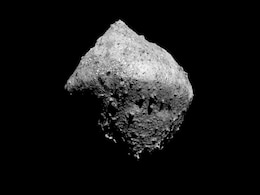

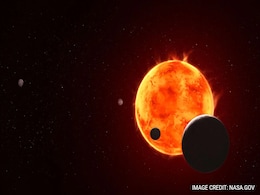
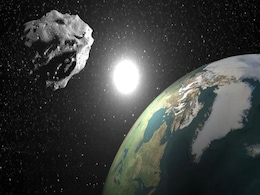
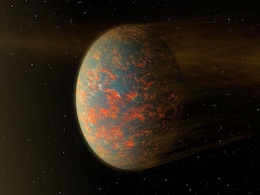
![Gadgets 360 With Technical Guruji: Did You Know? [March 30, 2024] Gadgets 360 With Technical Guruji: Did You Know? [March 30, 2024]](https://c.ndtvimg.com/2024-01/5oeiv1lo_did-you-know_640x480_20_January_24.jpg?downsize=245:163)



